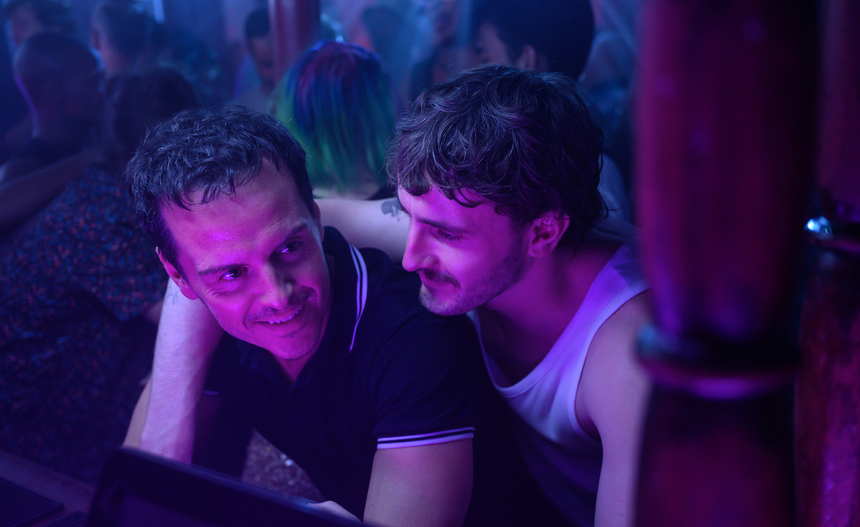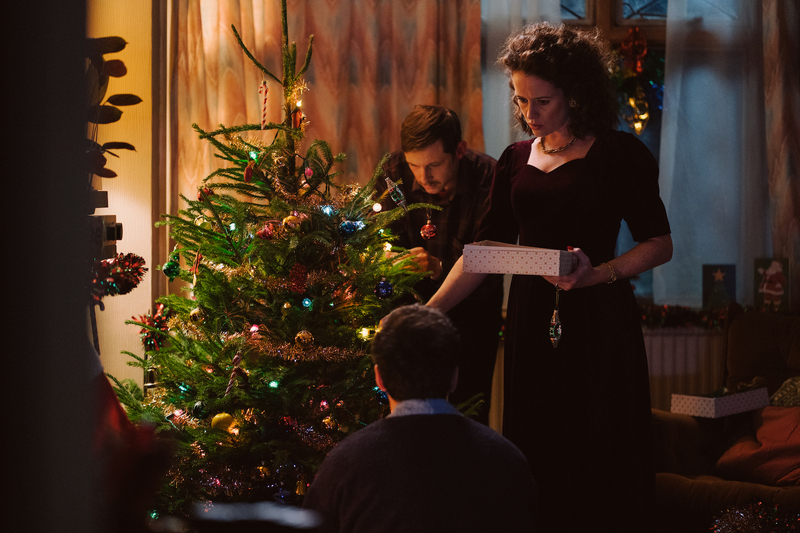ALL OF US STRANGERS Review: The Crossroads of Love and Memory

Loneliness has ever been a part of the human experience - after all, if we can be lonely even in a crowd, even among friends, it's been happening to us since we started walking upright. But argubaly it's gotten much worse, particularly in recent years, under the scrouge of capitalism, which has stripped us of so much community. Now too many of us exist in great towers, cut off from daylight and fresh air, and each other, as we are filed away, made ever more seperate by technology. It's no wonder that some of us find solace in lives that never were, in ghosts of the past or the would-have-been future.
Uk filmmaker Andrew Haigh has a particular insight into a certain depth of loneliness, and a flair for portraying that on screen. His films Weekend and 45 Years both express that aching loneliness which comes from not being seen, not being heard, not being wanted in the way you wish you were; of a life that should have been but never happened, of mistakes inadvertent that lead to lost dreams. He returns to this All of Us Strangers (based on the novel by Japanese author Yamada Taichi), returning to familiar themes, wrapping them in a ghostly love story.
Adam (Andrew Scott) leads what could be called a life of quiet desperation, with emphasis on the quiet part. He's one of the few inhabitants of a new apartment tower, living high up, with a gorgeous view of a city that seems closed off to him. His work as a screenwriter means he works from home; most of his friends have moved out of the city; he hasn't dated anyone in a long time. Like many of us who would be in this situation, there is no easy answer to how to escape it.
One of the few other residents, Harry (Paul Mescal), comes to Adam's door one night, somewhat drunk and looking for company. Harry politely declines - and the next day, finds himself going to his childhood home he shared with his parents in the suburbs, at least until they died in a car accident when he was 12. Except, his parents (Jamie Bell and Claire Foy) are still there, looking exactly as he last remembered them before they died in the 80s. And it seems they were waiting for him, happy to meet him as a now 40-something man, and learn what he has become in their absence.
The introduction of the ghosts is so natural, that it makes you wonder why we would ever accept ghosts as anything but natural. There is no suggestion that this is just in Adam's mind - you can smell the cigarettes Dad is smoking, you can smell the perfume Mum wears, you can feel the cloth of their sweaters as Adam hugs them, for the first time in thirty years. The parents are not shocked by the time passing, and Adam keeps on visiting, as if he were an ordinary adult child visiting is ordinary parents.
 Except there is much they need to know: first, that he is gay, and the acceptance by his mother is not immediate. But then that was the 80s, when AIDS dominated the headlines and same-sex partners were referred to as one's 'special friend'. His father apparently knew because Adam couldn't catch a ball. But stereotypes and a little education besides, Adam finds himself drawn into a world where his parents could know him as he is, and he in turn can find solace in that comfort of a home that was taken from him too quickly. Being queer means a different kind of isolation - as much as the world is welcoming now, there are still enough people who are not, and Haigh examines those whom especially don't fall into the heteronormative life cycle of marriage and children, and how that makes those of a certain age, especially without family, even more isolated.
Except there is much they need to know: first, that he is gay, and the acceptance by his mother is not immediate. But then that was the 80s, when AIDS dominated the headlines and same-sex partners were referred to as one's 'special friend'. His father apparently knew because Adam couldn't catch a ball. But stereotypes and a little education besides, Adam finds himself drawn into a world where his parents could know him as he is, and he in turn can find solace in that comfort of a home that was taken from him too quickly. Being queer means a different kind of isolation - as much as the world is welcoming now, there are still enough people who are not, and Haigh examines those whom especially don't fall into the heteronormative life cycle of marriage and children, and how that makes those of a certain age, especially without family, even more isolated.
It’s no coincidence that as Adam finds this shelter with his parents, even if getting to know them through adult eyes, and they getting to know him, is a little rough, that he is finally finding love. Haigh allows us this wonderfully tender story: the first time they make love is both erotic and sensitive; we’re given a montage of homemade dinners and take-aways, nights cuddled on the couch watching old reruns of Top of the Pops; conversations both mundane and deep. We all dream of this beginning. As Adam dreams of his parents, who, like Harry, have come into his life so suddenly and yet, seemingly, so perfectly.
Whether or not Mum and Dad are literal ghosts, or this is all just in Adam's imagination, is perhaps not relevant - he needs to understand his parents, and needs them to understand him, to know how he got to where he is - a lonely road he had to walk alone, but perhaps he doesn't have to anymore. All four of the actors (and it really is just about these four, there aren't even any supporting characters to take up space) are operating on profoundly raw emotional levels - finding such nuance in expression of their joy, their pain, their desire, and their fervent wish that things could have been different, had fate not played a cruel hand.
Haigh makes specific and just the right amount 80s music that will make anyone of a certain age feel nostalgic. But I was struck most by the close-ups and the lighting - there is such a softness and melancholy that is felt through seeing the character's eyes as they look upon that which they have loved and lost, or that which they are beginning to love, and that which they are finding the truth of and accepting. This is so much about how we must find that centre between our heads and our hearts, how we reach out our hands and find the truth with what comes through our senses.
Sentimental with being cloying, serious without just the right touches of whimsy, joyful and yet knowing the sadness that comes with joy, All of Us Strangers is a deeply affective film, of love and loneliness, understanding and anger, joy and terrible sorrow, and the paths that lead backwards and ahead.
All of Us Strangers will be released by Searchlight Pictures in the USA on Friday, December 22nd, and in Canada on Friday, January 5th.
All of Us Strangers
Director(s)
- Andrew Haigh
Writer(s)
- Andrew Haigh
- Taichi Yamada
Cast
- Andrew Scott
- Paul Mescal
- Carter John Grout







